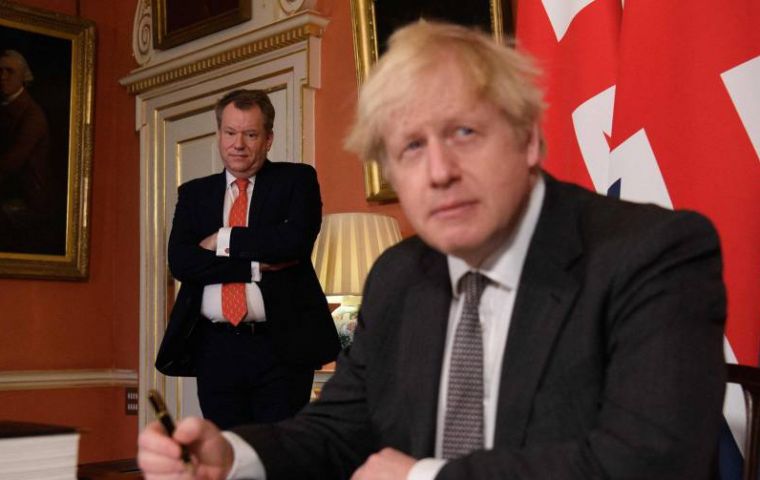MercoPress. South Atlantic News Agency
A UK-EU trade war?
 Lord David Frost called the Brexit treaty an “excellent deal” and PM Boris Johnson hailed it as a “fantastic deal,” but that was before the 2019 election.
Lord David Frost called the Brexit treaty an “excellent deal” and PM Boris Johnson hailed it as a “fantastic deal,” but that was before the 2019 election. By Gwynne Dyer – International treaties are serious business. A lot of time and effort goes into negotiating them and they become part of international law. It’s very rare for a politician to say, only a couple of years after negotiating a treaty, that his country always felt it was “a little bit provisional and open to review.
That was Lord David Frost, who is still described as Britain’s chief Brexit negotiator two years after Brexit happened.
(That’s because he is still trying to renegotiate it.)
At the time, he called the Brexit treaty an “excellent deal” and Prime Minister Boris Johnson hailed it as a “fantastic deal,” but that was before the 2019 election.
A new crisis is bubbling up now because the Northern Ireland part of the deal is falling apart. It could trigger a British trade war with the European Union and a return to real war in Northern Ireland, but the deal is falling apart mainly because the Conservative-led British government was lying when it agreed to it in 2019.
Johnson was new in office in 2019 and desperately needed to get Brexit done. Only then could he call an election and hope to win a majority in Parliament. So he made an agreement with the EU on post-Brexit trade relations, especially regarding Northern Ireland, that fell far short of what his government actually wanted.
Dominic Cummings, who was Johnson’s right-hand man until he lost an internal power struggle a year ago, explained last week why he and a few allies got Johnson to sign a document they had no intention of honoring.
“We wriggled [through the negotiations with the EU] with the best option we could,” Cummings said, “and intended to get Johnson to ditch the bits we didn't like after whacking [Labour Party leader Jeremy] Corbyn” in an early election.
And so it came to pass. The Conservatives buried Corbyn in a landslide in the December 2019 election and the United Kingdom finally left the EU in January 2020 — or, rather, most of it did. The “bits we didn’t like” mostly had to do with Northern Ireland, which for customs purposes remained in the European Union.
Why?
The Troubles between the Loyalists (Protestants who wanted to stay in the United Kingdom) and the Nationalists ( Catholics who wanted to make Northern Ireland part of the Irish republic) killed an estimated 3,500 people from 1969 to 1998. Preserving the Good Friday Agreement that ended the killing was vital, but it wasn’t easy.
When the agreement was signed, both the U.K. and the Irish Republic were members of the EU, so the border between them could be opened — no checkpoints, no movement controls, no customs duties. That allowed Nationalists to come and go as they wished and think of themselves as Irish citizens, while Loyalists could go on believing they lived in the United Kingdom.
Unfortunately, Brexit required creating a real customs frontier between the U.K. and the EU. Since a hard border on land would undermine the faith of Northern Irish Nationalists in the Good Friday deal and probably start the war again, London reluctantly agreed to put the border in the Irish Sea instead.
There would continue to be complete freedom of movement for people and goods throughout Ireland, while goods coming into Northern Ireland from the rest of the U.K. would go through EU customs checks at the Northern Irish ports.
It was a cumbersome solution that most Brexiteers hated because it infringed on British sovereignty, but Johnson was in a hurry, so he signed. He then went around promising everyone in Northern Ireland that there would never be customs checks on goods passing between there and the rest of the U.K. Was he lying or had he simply not read the treaty properly?
Cummings claims that Johnson never understood what the deal he signed meant. But Johnson is not nearly as stupid as he pretends and most EU governments believe he knowingly signed in bad faith.
Which brings us to the present. There have been serious delays in the way the customs controls work in the Northern Irish ports, and the EU has just offered to exempt about half the affected food and medicines from all checks.
That was an olive branch, but Johnson just raised a new demand — that the European Court of Justice no longer have jurisdiction over possible violations of the treaty. And Lord Frost has threatened to suspend the treaty entirely if the EU does not give in.
EU authorities suspect Johnson is seeking an excuse to blow up the treaty so he can scapegoat the Europeans for the ensuing trade war and renewed war in Northern Ireland. Matters are getting worse in the U.K. on a number of fronts and he needs a distraction.
Would Johnson really do that? He probably doesn’t know yet himself.




Top Comments
Disclaimer & comment rulesCommenting for this story is now closed.
If you have a Facebook account, become a fan and comment on our Facebook Page!